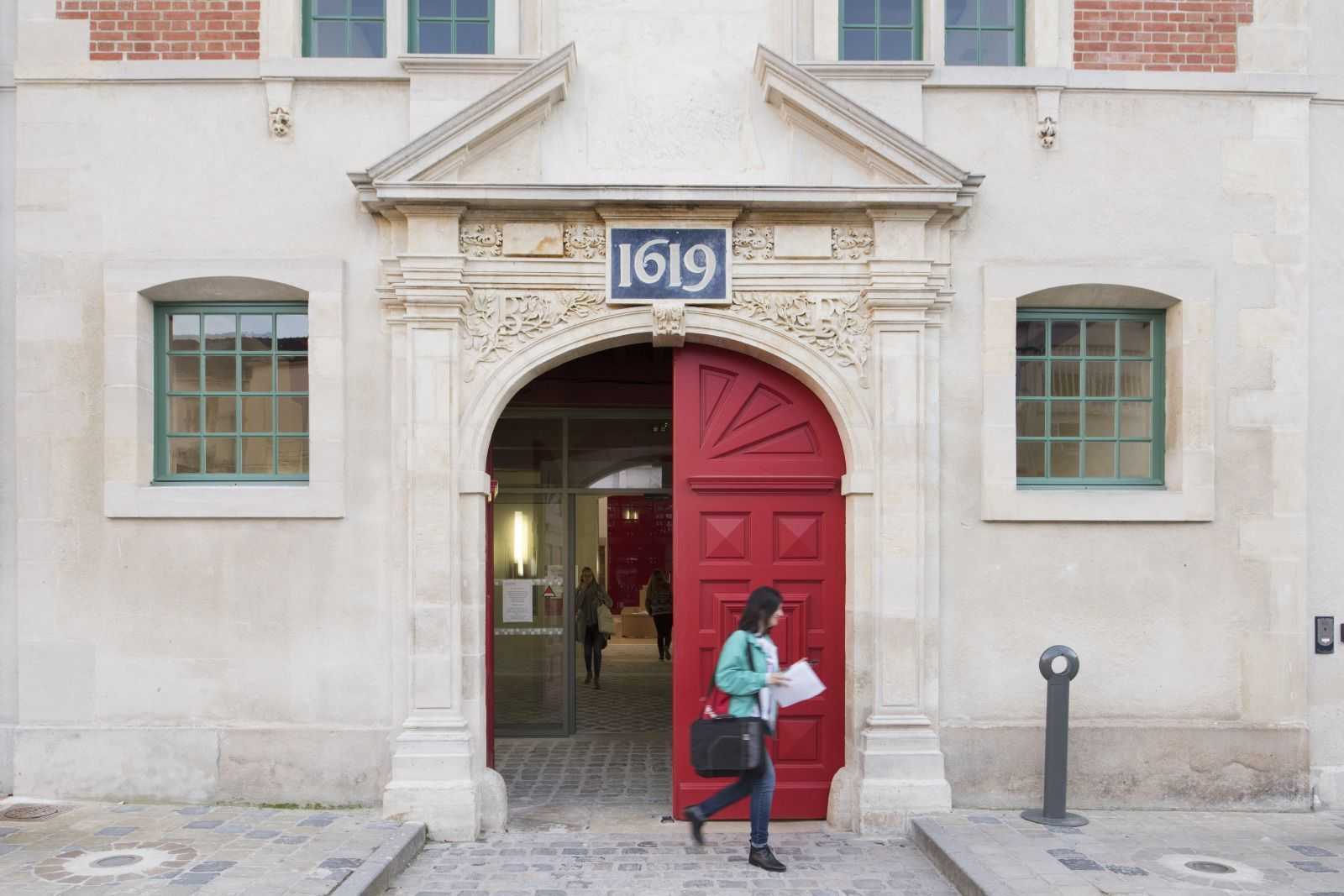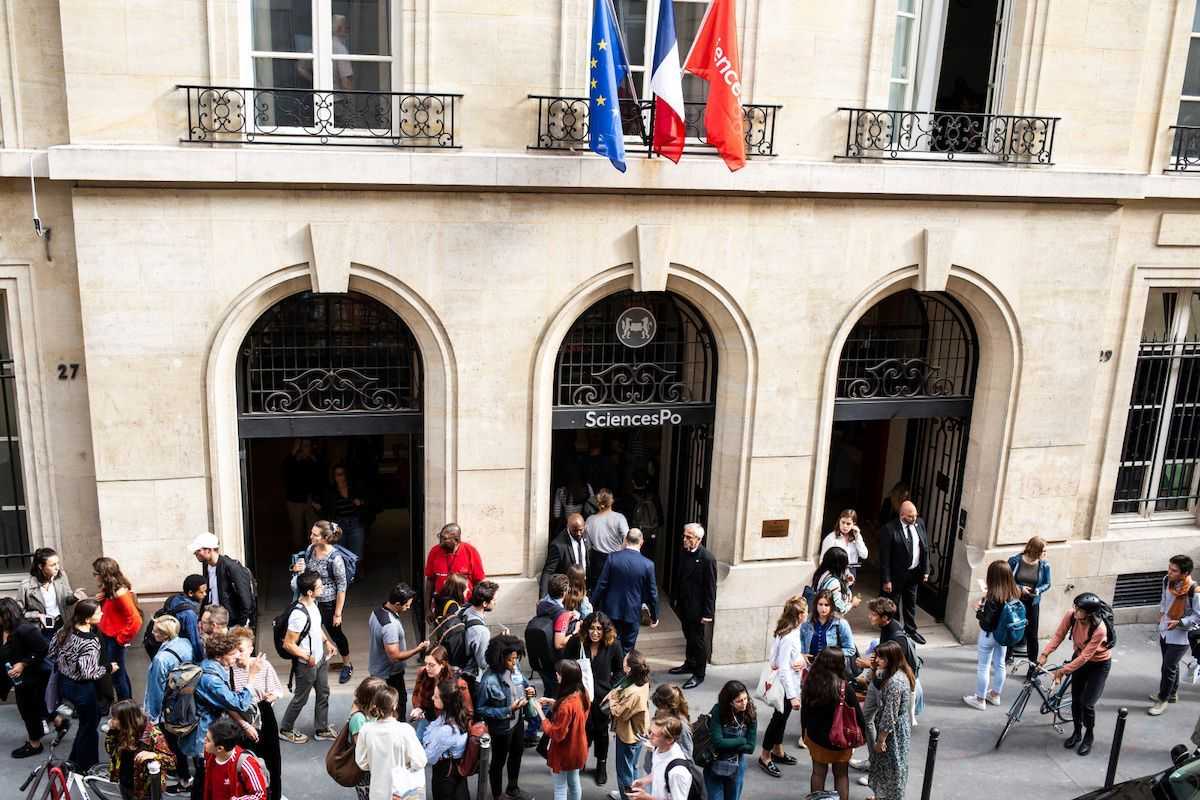
Home>Study>Foreign Languages
Foreign Languages
The teaching of languages is part of the basic training provided to students at Sciences Po. At both the Undergraduate College and at Master's level, the objective is not only for students to attain French-English bilingualism but also to acquire knowledge of other languages in order to prepare them for the demands of the job market, whatever the area of activity. The choice of languages, other than French and English, is made by the students in line with their study plans and career objectives.
20 languages are taught on the seven Sciences Po campuses: German, English, Arabic, Chinese, Spanish, French as a Foreign Language (FLE) for non-French speaking students, Hebrew, Italian, Japanese, Portuguese, Russian, Turkish and French Sign Language (LSF) as well as languages specific to the Sciences Po regional campuses (Swahili, Persian, Swedish, Polish, Hungarian, Czech and Romanian).
Sciences Po also offers ad hoc language training for students who, as of the second year of their Master's degree, intend to sit competitive examinations for the French and European civil services.
In addition, students in Paris have the opportunity to study rarely taught languages at INALCO (Institut national des langues et civilisations orientales) under an agreement between the two institutions.
Nearly 500 language teachers work across all the Sciences Po campuses. This reflects the importance that Sciences Po attributes to language training.
In language training, students are grouped according to level and in small class sizes. Classes are interactive and focus on the acquisition of four skills: spoken expression, written expression, listening comprehension and reading comprehension. From level B1 onwards, the content of classes and the targeted vocabulary are increasingly linked to current social, political, economic and cultural issues. The educational tools are varied: written documents, audio documents, videos and digital media.
In addition to the classes, e-learning and language tutoring are offered as well conversation exchanges between pairs of students in the languages they are familiar with.
The teaching of languages at Sciences Po is in line with the Common European Framework of Reference for Languages (CEFR) and is provided at different levels ranging from A1 to C2: A1 “introductory or discovery level”; A2 “intermediate or survival level”; B1 “threshold level”; B2 “advanced level”; C1 “advanced level or effective operational proficiency”; C2 “mastery or proficiency level”.
Each level is governed by a charter which defines the objectives, skills to be attained, the linguistic structures to be mastered, the quantity and nature of the work required, and the evaluation procedures. Evaluation of language learning is carried out on an ongoing basis.
The charters also provide information about the evaluation procedures.
In addition, they allow students who were not studying at Sciences Po in the previous semester to self-assess in advance of the online course registration.
Note: students who were already present at Sciences Po in the previous semester are not included in the self-assessment because they have already been evaluated by their teachers.
In all languages, for levels A1, A2, B1 and B2, a standardised end-of-semester test is organised as part of the continuous assessment. Progression from one level to the next is carried out upon the advice of the teacher who has monitored the student’s progress during the semester and according to the results obtained by the student.
For non English-speaking students, the objective at the end of their studies is to attain and validate, for English, level C1 of the Common European Framework of Reference for Languages.
In order to ensure academic coherence and with a view to effective linguistic progression, it is not possible to change language from one semester to the next. In the same vein, upon beginning the first year of a Master's degree, students are strongly advised not to abandon one or two previously studied languages for which level C1 has not yet been attained to begin the study of a new language. This is particularly advised for languages requiring complex and long-term learning, as is the case for Arabic, Chinese, Japanese and Russian among others.
It is essential for the student to refer to the course outline of his or her Undergraduate College or Master's degree programme to become familiar with the language learning requirements. Students will only be able to register for the language(s) indicated on their individual student profile.
International exchange students who do not have any language learning obligations may also take classes in two languages. For these students, particularly when they do not have sufficient knowledge of French, it is strongly advised against opting for a language with more than 2 hours of classes per week.
Non-native English speakers are required to get a C1 certification in English (as defined by the Common European Framework of Reference) by the end of their Master’s degree. This certificate is compulsory in order to graduate from Sciences Po.
Several certificates are accepted: the TOEFL iBT, the IELTS Academic and the Cambridge C1 Advanced.
The minimum scores or levels required for graduation are:
- for the TOEFL iBT: 100 to 120;
- for the IELTS: 7 to 8;
- for the CAMBRIDGE: 180-210.
The students who have a B.A., an M.A. or a PhD awarded by an English-speaking University can benefit from an exemption regarding the English language certificate if they send a copy of their diploma to certification.master@sciencespo.fr.
Students who wish to extend the validity of a C1 certificate taken during their second year of their undergraduate program or before they joined the Master’s program at Sciences Po have to abide by the following rule set by the Office of Academic Affairs: «The validity of the test taken by the students of the undergraduate program during their second year will be extended exceptionally (to up to 5 years but just for the students who took a gap year). They will keep the benefit of the C1 level when they graduate from their Master’s degree provided their degree is taught in English or they have actually attended a C1 English class or followed a course which is taught in English (24 hours minimum) during their Master’s degree. This measure only concerns the students who were directly admitted to Sciences Po for the first year of their Master’s degree.».
During their second year, Master’s students who already have a valid certificate can email a copy to certification.master@sciencespo.fr, along with a grade report of their Master’s degree (any semester will do) giving an explicit mention of the C1 English class the student has actually attended or the course taught in English they have taken and passed.
The students who do not have a valid certificate will be offered one session of TOEFL iBT (preferably in an ETS centre in France) organized by Sciences Po. Their registration will be fully funded by the University, with the understanding that students will only be entitled to one fully funded English test during their whole studies at Sciences Po.
Prepare for the test TOEFL iBT (preferably in an ETS centre in France)
Two free training tools are available for everyone. You do not have to register for the test to have access to these websites:
- The Insiders’ guide to the TOEFL iBT : this webinar (MOOC) is available on the platform EDx. This comprehensive course enables future test takers to explore the four skills of the test and to discover all types of questions; it offers examples of questions from past papers.
- TOEFL iBT Free Practise Test is a full practice test which is available online: it features all 4 sections and real past test questions. The first two sections (Reading/Listening) are graded; the sections Speaking/Writing are not graded but the test taker will have access to the grading criteria.
Undergraduate College and Master's students may only change language once during their studies. It is possible to replace your current second language with another language.
Note: In order to guarantee effective linguistic progression, any change of second language will be definitive so as to ensure the development of a coherent learning pathway and sufficient progression.
- In Master 1, the request for change, whatever the language and level, must be made in a justified and argued way between the 8th and the end of the 9th week of semester 1 (to contact us, please fill out this Google form).
- In Master 2, no change requests will be accepted in view of the above information.
Despite an average of 10/20 or above (or sufficient results in the four skills in English class), the teacher may feel that the student has not attained all the objectives and competencies defined within the charter to make sufficient progress at the next level.
The decision of whether or not to progress to the next level is the teacher’s decision alone.
Whether at the Undergraduate College or at Master’s level:
- No change of level is possible if the student has taken a language course at Sciences Po in the previous semester. His or her teacher will have determined the level at which he or she should be enrolled, on the basis of the various assignments and evaluations carried out.
- A change of level is possible if the student has not followed a language course at Sciences Po in the previous semester and has self-assessed. In this case, it is the teacher’s responsibility to send a request for a change of level by e-mail to the Language Service during the first two weeks of the semester.
Sciences Po has signed two agreements with partner institutions in relation to language learning:
- l'ENSAE (École Nationale de la Statistique et de l'Administration Économique) (ENSAE ParisTech): for students enrolled at both Sciences Po and ENSAE.
- l'INALCO (Institut National des Langues et Civilisations Orientales) (National Institute for Oriental Languages and Civilizations): for oriental languages in particular.
Students have the opportunity, under certain conditions, to follow and validate courses of study at one or other of these institutions.
For further information and to find out whether or not your training will be supported by Sciences Po, please contact the Language Department (without going to Inalco) before mid-July:
Contact the Language Department
Address:
199, boulevard Saint-Germain - 75007 Paris
Student Reception (Entrance via the glass door)
1st floor, reception office 603, 604 and 604 bis
Office hours:
- Monday, Tuesday and Thursday, 9.30am - 12.45pm and 2.15pm - 4.45pm
- Wednesday and Friday, 9.30am - 12.45pm
Contact:



